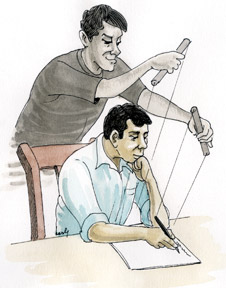Identity that is veiled
 Gabriel Garcia Marquez recently won a landmark judgment. His novella
‘Chronicle of a Death Foretold’ is alleged to have been based on a
living character and a living account. ‘Márquez's book tells the story
of Bayardo San Román, a wealthy Colombian who Palencia said was modelled
on him,’ so states Guardian, which reported the judgment. The Colombian
must have aimed at a heavy wad of cash, it is hinted as the report
progresses. But he has lost the case, as the verdict ruled the work is
original. Gabriel Garcia Marquez recently won a landmark judgment. His novella
‘Chronicle of a Death Foretold’ is alleged to have been based on a
living character and a living account. ‘Márquez's book tells the story
of Bayardo San Román, a wealthy Colombian who Palencia said was modelled
on him,’ so states Guardian, which reported the judgment. The Colombian
must have aimed at a heavy wad of cash, it is hinted as the report
progresses. But he has lost the case, as the verdict ruled the work is
original.
The ruling in favour of Marquez indicates that the creative writer
can have influence from what happens in his environs.
Marquez doesn’t enjoy any popularity or publicity like R K Narayan in
Sri Lanka. He seems quite alien to the local circles. Those who go to
town on Latin American fiction, I have a definite feeling, have not
grasped Marquez properly. Well, I haven’t either! I have no wish to
explain any Marquez theory here.
But the Guardian story, which was sent by a senior friend, provoked
me to be lost in thoughts. Naturally when most writers pen something,
mostly a novel, chances are more that readers take it to be a real-life
experience. They try to link the story, at least tidbits, with the
author’s life. It has happened, and even now I happen to hear such
stories on grapevine.
This is why, I presume, most writers dread using their real names.
 There are people who write about real life. You call it a memoir
especially when a celebrity writes it. Is writing the real life easy?
The answer must be a split one. For those who entertain skeletons in
their cupboards, it will be half memoir, half fiction. So what? A reader
won't care if it is true, at times. If it is a hagiography, it will
mostly consist of true incidents of spiritual adventures and struggles.
So yes, the answer is split: half yes and half no. There are people who write about real life. You call it a memoir
especially when a celebrity writes it. Is writing the real life easy?
The answer must be a split one. For those who entertain skeletons in
their cupboards, it will be half memoir, half fiction. So what? A reader
won't care if it is true, at times. If it is a hagiography, it will
mostly consist of true incidents of spiritual adventures and struggles.
So yes, the answer is split: half yes and half no.
One question I had when I read ‘Road from Elephant Pass’ years back
was if the author was a soldier himself. I soldiered on with the dilemma
until I met its author Nihal de Silva one fine day at the launch of the
book. He burst into laughter when I posed him that question, and was
firm in his ‘no’. Later on I felt how silly it was for having had such a
question. Does a novelist always have to be familiar with the setting of
the novel? In Sri Lanka you got to be, though. Otherwise most critics
will take on you for writing unfamiliar stuff.
D R Wijewardene memorial award is the Gratiaen for unpublished
Sinhala novelists. I remember the situation when one book was finally
given the cash award. It was heavily criticized mainly because critics
and the runners-up claimed the novelist is not familiar with what he has
written. The novel is based on Jaffna. Makes sense, somewhat. It’s hard
to write about a distant hemisphere.
George Bernard Shaw once had a letter from a soldier in the
battlefront. The soldier had ridiculed the Irish playwright saying he
has no experience at the battlefront, and questioned how he managed to
write such naïve accounts. You have that disadvantage, when you are in
the creative writing: you are not familiar with everything under the
sun. The soldier has more battle experience than Shaw but he cannot
write. It’s the paradox inevitable.
This kind of problems does not arise in works historical fiction. No
one knows how Julius Caesar dined. Everybody has to bank on what is
written down scrolls. And we are pretty sure any writer has their own
bit of pure imagination. Of course we have a good driver’s license:
figures of speech – and ‘exaggeration’ is a good tool.
So, most writers hide their identity. They have to, in fact. There
are cases like that of Marquez. You cannot write about people you know.
They won’t be offended to read about themselves, if the author is
someone else. So the best option is to opt out your real identity. Be a
ghost to your own writing!
This is not ghostwriting, which is something else. But no one
prosecutes you for seeing some connection in the concept.
Why we tend to link real life incidents with the novel is because it
has real life! Imagination can do wonders. That is why people throng
around works of art. No artiste who has sculpted or painted the Buddha
or Christ has ever seen the religious founders. It is the offshoot of
brilliant imagination.
And we are fond of being taken for a ride.
[email protected]
|



